仁爱版八年级英语Unit2 Topic2学案
八年级英语仁爱版上册Unit2_Topic2_SectionB优质课教案

Unit2 Topic2 SectionB优质课教案主讲教师:林海燕指导教师:林晴晖I. Material analysis:本课时的主要活动为1a, 3a和3b。
本课就吸烟这个坏习惯展开讨论,呈现了本单元语法重点:情态动词must+动词原形:I must ask him to give up smoking.表示建议、劝告。
同时巩固了动名词做主语的句式:Smoking is bad for his health.通过学习Section B,让学生能够辨别好习惯与坏习惯,并能帮助亲人戒掉坏习惯。
课后要求学生会用动名词做主语造句,能用must提建议。
Ⅱ. Teaching aims and demands1. New wordsarticle, smoke, cancer, even, energy, necessary, active2. Phrasesread in the sun, be bad for…, an article about smoking, in the newspaper, help him relax,the article says, cause cancer, ask sb. to do sth., give up sth./doing sth., show sth.to sb.3. Useful expressions(1)I'm reading an article about smoking in the newspaper.(2)He thinks smoking can help him relax.(3)The article says smoking is bad for our lungs and it can even cause cancer.(4)I must ask him to give up smoking.4. Modal verbmust and mustn’t5. Skill aims(1)Talk about good habits and bad habits.(2)Learn to use modal verb must and mustn’t correctly.(3)Learn to use intonation to read the dialogue correctly.6. Emotional aims:Learn to keep good habits and give up bad habits.Ⅲ. The key points and difficult points1. Key points(1)Learn to use modal verb must and mustn’t correctly.(2)I must ask him to give up smoking.2. Difficult pointsLearn to use gerund as subject correctly.Ⅳ. Learning strategies1.通过图片教学和句子翻译记忆词汇。
仁爱英语八年级上Unit 2Topic 2 Section C导学案

栗子乡中学英语“交际—互动”模式导学案时间:第周星期20 年月日课题Unit 2 Topic 2 Section C 设计人刘小明学习目标1、词汇:pain, disease, itself, might, empty, stomach, human, body, through, skin, illness, air, sour, tidy, sweep, spit,2、语法:学会使用情态动词might, must, must not, can, should, shouldn’t, 并会用其围绕健康的生活习惯展开话题。
学习过程交流诊断1、小组分角色朗读35页1a对话。
2、改写句子:He must give up smoking.⑴、否定句:He give up smoking.⑵、一般问句:he up smoking? 否定回答:No, .情景呈现1、小组自主学习拼读本节生词,并齐读。
2、读课文,勾画出生词后完成:疼痛_____ 病_______它自己_____身体可能______ 空的____ __ 胃人类的穿过皮肤疾病空气酸的弄整洁扫吐痰3、在课本中找出下列短语并翻译:1).去看医生________________ 2).……出问题/有毛病________ ___3).努力工作______________4).空腹_____________________5).进入,陷入__________________6). 保持空气清新________7). 扫地______________ 8).在公共场所__________交际互动1、听1a录音回答问题:What is a headache ?__________________2、听录音, 跟读1a,然后齐读课文。
3、小组合作完成1b, 然后在班上交流答案。
4、在组长带领下群学课文,掌握下列知识点。
1). show v. 显示,出示,表明。
仁爱版英语八年级上册 Unit2 Topic2 单元复习学案 (含答案)

Unit 2 Keeping HealthyTopic 2 I must ask him to give up smoking.熬夜放弃照顾做晨练早睡早起in fact not only…but also…as soon as as soon as possible检测:4. To our (惊奇),he was the first one to cross the finish line.5. Tom didn’t go to work yesterday because of [ˈɪlnəs] .6. It’s (必需的) to drink water every day.7. I am good at math, but I am w in Chinese.10. Keeping the long fingernails is an (healthy) habit.11. (with) any help, he can finish the work on time.12. Having breakfast can give us [ˈenədʒi ] for the morning.13. Having breakfast can make us (活跃的) in the morning.14. Jane likes to eat_______(tomato) very much.15.Different people have different_______(品味) in music.1. Staying up late is bad for your health.熬夜有害你的健康.(动名词短语做主语) Walking is good exercise and it is necessary for good health.散步是很好的锻炼,是身体健康必不可少.2. Is getting up late good or bad for your health? It’s bad.晚起床对你的健康有益还是有害? 有害. (选择问句要根据事实回答)3. Her mother always forced her to drink the milk. 她妈妈总是逼迫她去喝牛奶.4. Kangkang’s mother often told him not to eat too much sugar when he was a child.当他是小孩时,康康的母亲经常告知他不要吃太多的糖。
仁爱版八年级英语上册UNIT 2 TOPIC 2 Section C教案
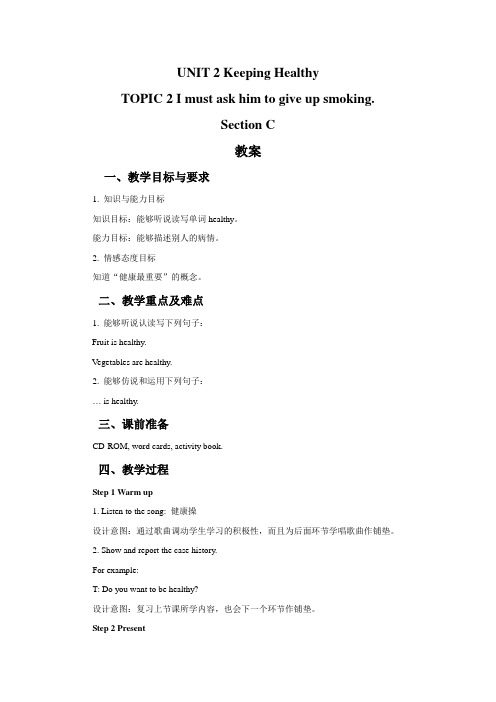
UNIT 2 Keeping HealthyTOPIC 2 I must ask him to give up smoking.Section C教案一、教学目标与要求1. 知识与能力目标知识目标:能够听说读写单词healthy。
能力目标:能够描述别人的病情。
2. 情感态度目标知道“健康最重要”的概念。
二、教学重点及难点1. 能够听说认读写下列句子:Fruit is healthy.Vegetables are healthy.2. 能够仿说和运用下列句子:… is healthy.三、课前准备CD-ROM, word cards, activity book.四、教学过程Step 1 Warm up1. Listen to the song: 健康操设计意图:通过歌曲调动学生学习的积极性,而且为后面环节学唱歌曲作铺垫。
2. Show and report the case history.For example:T: Do you want to be healthy?设计意图:复习上节课所学内容,也会下一个环节作铺垫。
Step 2 Present1. Check memory.承接上一个活动。
T: What happened to XX?老师做动作,提示学生理解这句话在这种情况下的意思,并引导学生回答:XX’s got a…通过问答练习,使学生掌握介绍他人病情的句型。
Practice with partner.T: Do you want to be healthy?T: Eat vegetables every day. Eat some fruit, too. Drink lots of water or juice. Do exercise every day. …设计意图:通过一个游戏式的复习活动,引出并学习新句型,使学生更容易理解和掌握句型。
2. Guessing game.展示几张健康生活和不健康生活方式的图片,让学生们思考。
Unit 2 Topic 2 SectionD 教案仁爱版八年级英语上册
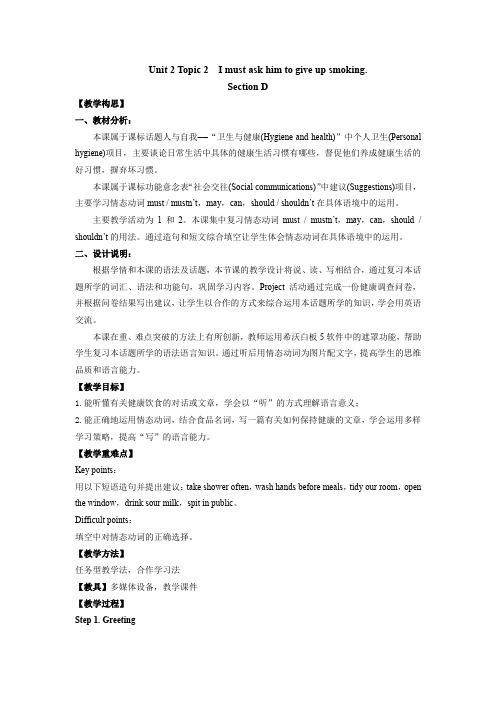
Unit 2 Topic 2 I must ask him to give up smoking.Section D【教学构思】一、教材分析:本课属于课标话题人与自我——“卫生与健康(Hygiene and health)”中个人卫生(Personal hygiene)项目,主要谈论日常生活中具体的健康生活习惯有哪些,督促他们养成健康生活的好习惯,摒弃坏习惯。
本课属于课标功能意念表“社会交往(Social communications)”中建议(Suggestions)项目,主要学习情态动词must / mustn’t,may,can,should / shouldn’t在具体语境中的运用。
主要教学活动为1和2。
本课集中复习情态动词must / mustn’t,may,can,should / shouldn’t的用法。
通过造句和短文综合填空让学生体会情态动词在具体语境中的运用。
二、设计说明:根据学情和本课的语法及话题,本节课的教学设计将说、读、写相结合,通过复习本话题所学的词汇、语法和功能句,巩固学习内容。
Project活动通过完成一份健康调查问卷,并根据问卷结果写出建议,让学生以合作的方式来综合运用本话题所学的知识,学会用英语交流。
本课在重、难点突破的方法上有所创新,教师运用希沃白板5软件中的遮罩功能,帮助学生复习本话题所学的语法语言知识。
通过听后用情态动词为图片配文字,提高学生的思维品质和语言能力。
【教学目标】1.能听懂有关健康饮食的对话或文章,学会以“听”的方式理解语言意义;2.能正确地运用情态动词,结合食品名词,写一篇有关如何保持健康的文章,学会运用多样学习策略,提高“写”的语言能力。
【教学重难点】Key points:用以下短语造句并提出建议:take shower often,wash hands before meals,tidy our room,open the window,drink sour milk,spit in public。
仁爱版八年级英语学案Unit2_Topic2.docx
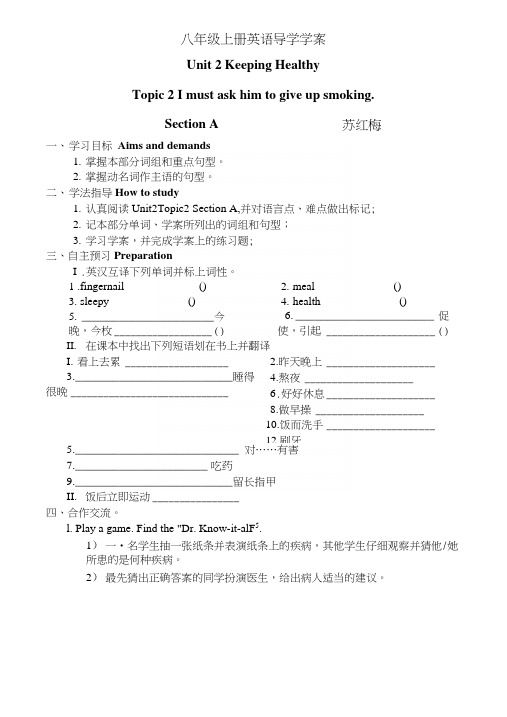
八年级上册英语导学学案Unit 2 Keeping HealthyTopic 2 I must ask him to give up smoking.Section A 一、 学习目标 Aims and demands1. 掌握本部分词组和重点句型。
2. 掌握动名词作主语的句型。
二、 学法指导How to study1. 认真阅读Unit2Topic2 Section A,并对语言点、难点做出标记;2. 记本部分单词、学案所列出的词组和句型;3. 学习学案,并完成学案上的练习题;三、自主预习PreparationI .英汉互译下列单词并标上词性。
II. 在课本中找出下列短语划在书上并翻译I. 看上去累 ___________________ 3. _________________________ 睡得很晩 _____________________________ 5. __________________________ 对……有害7. _____________________ 吃药9. _________________________ 留长指甲II. 饭后立即运动 ________________四、合作交流。
l. Play a game. Find the "Dr. Know-it-alF 5.1) 一•名学生抽一张纸条并表演纸条上的疾病,其他学生仔细观察并猜他/她 所患的是何种疾病。
2) 最先猜出正确答案的同学扮演医生,给出病人适当的建议。
苏红梅1 .fingernail _____________ ()3. sleepy _____________ ()5. _____________________ 今晚,今枚 __________________ ()2. meal _____________ () 4. health _____________ () 6. ______________________ 促使,引起 ____________________ () 2.昨天晚上 ____________________4.熬夜 ____________________6.好好休息 ____________________8.做早操 ____________________10.饭而洗手 ____________________12.刷牙 ____________________3)选出班上的“百事通”医生。
仁爱版八年级英语上册-Unit2_Topic2_SectionD_精品学案
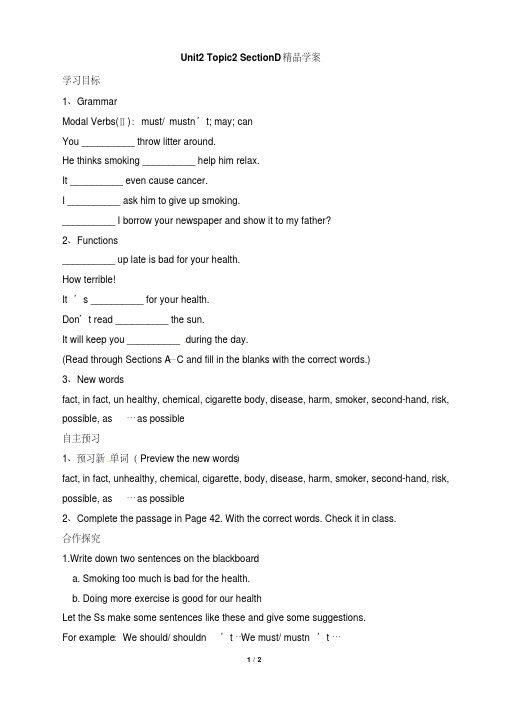
Unit2 Topic2 SectionD 精品学案学习目标1、GrammarModal Verbs(Ⅱ):must/ mustn’t; may; canYou __________ throw litter around.He thinks smoking __________ help him relax.It __________ even cause cancer.I __________ ask him to give up smoking.__________ I borrow your newspaper and show it to my father?2、Functions__________ up late is bad for your health.How terrible!It’s __________ for your health.Don’t read __________ the sun.It will keep you __________ during the day.(Read through Sections A—C and fill in the blanks with the correct words.)3、New wordsfact, in fact, un healthy, chemical, cigarette body, disease, harm, smoker, second-hand, risk, possible, as…as possible自主预习1、预习新单词(Preview the new words)fact, in fact, unhealthy, chemical, cigarette, body, disease, harm, smoker, second-hand, risk, possible, as…as possible2、Complete the passage in Page 42. With the correct words. Check it in class.合作探究1.Write down two sentences on the blackboard:a. Smoking too much is bad for the health.b. Doing more exercise is good for our healthLet the Ss make some sentences like these and give some suggestions.We must/ mustn’t…For example:We should/ shouldn’t… ______________________________________________________________________________________________________________________________________________________________________________________________________________________ _____________________________________________________________________________________________________________________________________________________________________________________________________________当堂评价Fill in the blanks with must/ mustn’t, may, can.1、You __________ answer my question in English.2、The students __________ talk in class.3、Mr. Smiths, __________ I ask you some questions?4、The children __________ play soccer in the street. It’s too dangerous.5、The boy __________ play ping-pong very well now.6、__________ I help you, sir?单项选择( )1. Plant more trees and grass. _______ is important to improve our environment.A、WhichB、ItC、WhatD、While( )2.My mother can’t go out. She must _______ my little brother.A、look upB、look likeC、look afterD、look at( )3.It’s very cold. Don’t go out _______ your coat.A、withB、withoutC、forD、in( )4.The old lady has _______, but she isn’t _______.A、enough money; enough happyB、money enough; happily enoughC、enough money; happy enoughD、money enough; enough happy。
仁爱版英语八年级上册 Unit2 Topic2 SectionA 精品学案
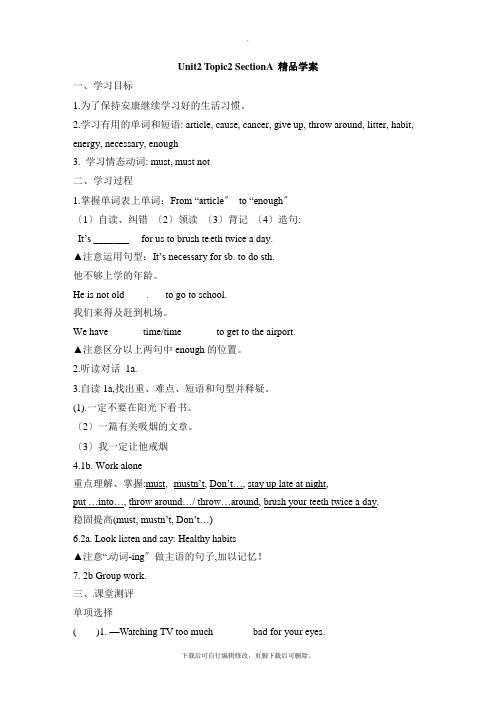
Unit2 Topic2 SectionA 精品学案一、学习目标1.为了保持安康继续学习好的生活习惯。
2.学习有用的单词和短语: article, cause, cancer, give up, throw around, litter, habit, energy, necessary, enough3. 学习情态动词: must, must not二、学习过程1.掌握单词表上单词:From “article〞to “enough〞〔1〕自读、纠错〔2〕领读〔3〕背记〔4〕造句:It’s ______ for us to brush te eth twice a day.▲注意运用句型:It’s necessary for sb. to do sth.他不够上学的年龄。
He is not old _______ to go to school.我们来得及赶到机场。
We have ______ time/time ______ to get to the airport.▲注意区分以上两句中enough的位置。
2.听读对话1a.3.自读1a,找出重、难点、短语和句型并释疑。
(1).一定不要在阳光下看书。
〔2〕一篇有关吸烟的文章。
〔3〕我一定让他戒烟4.1b. Work alone重点理解、掌握:must, mustn’t, Don’t…, stay up late at night,put …into…, throw around…/ throw…around, brush your teeth twice a day.稳固提高(must, mustn’t, Don’t…)6.2a. Look listen and say: Healthy habits▲注意“动词-ing〞做主语的句子,加以记忆!7. 2b Group work.三、课堂测评单项选择( )1. —Watching TV too much _______ bad for your eyes.—I’ll go to bed right away.A. isB. areC. wasD. be( )2. —If you feel _______, you should go to school.A. badB. worseC. betterD. good ( )3. —How often do you exercise?—_______A. Less than three times a week.B. More than 10 hours.C. From one thirty to three.D.I often do it.( )4. _______ necessary for us _______ English well.A. This is; to learnB. It’s; to learnC. It’s; learnD. That’s; learn。
仁爱版英语八年级上Unit2 Topic2 Section A教学案

Playing football is fun.
4.V-ing做动名词时的用法
(1)作主语。
①放在句首作主语,多表示一般或抽象的重复多次的行为。
Walking after supper is good for your health. 晚饭后散步对身体有好处。
请再举例:
②作真正主语(it替代动名词作形式主语)。
It is no use copying the words so many times. 这么多遍单词没有用。
请再举例:
(2)作宾语。
①放在介词后作宾语。
Thank you for helping me. 谢谢你帮助我。
请再举例:
②在consider(考虑), enjoy, face, feel like, finish, give up, imagine, keep, mind,
miss, practice, can't help (禁不住), can't stand, look forward to等动词或词组
之后作宾语。
如:
At the news, he couldn't help crying. 一听到这个消息,他禁不住哭了起来。
请再举例:
五.随堂练习
(一)根据图示模仿3a编五个对话。
仁爱版八年级英语上册(新)学案:Unit 2 Topic 2 Sec
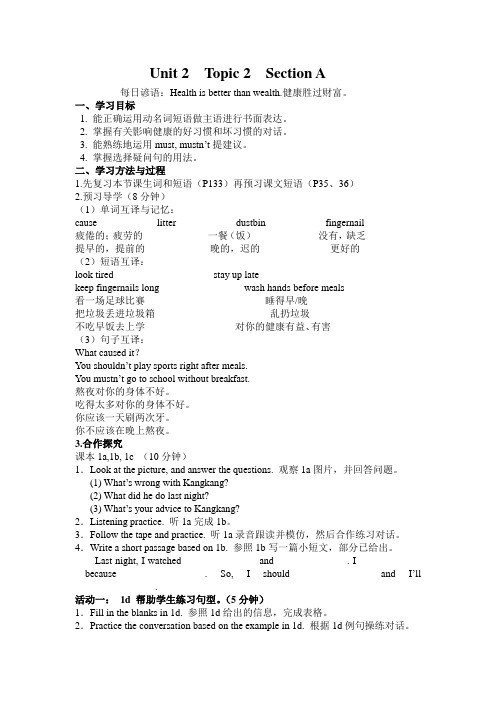
Unit 2 Topic 2 Section A每日谚语:Health is better than wealth.健康胜过财富。
一、学习目标1. 能正确运用动名词短语做主语进行书面表达。
2. 掌握有关影响健康的好习惯和坏习惯的对话。
3. 能熟练地运用must, mustn’t提建议。
4. 掌握选择疑问句的用法。
二、学习方法与过程1.先复习本节课生词和短语(P133)再预习课文短语(P35、36)2.预习导学(8分钟)(1)单词互译与记忆:cause__________ litter__________ dustbin__________ fingernail___________ 疲倦的;疲劳的___________ 一餐(饭)___________ 没有,缺乏___________ 提早的,提前的___________ 晚的,迟的____________ 更好的____________ (2)短语互译:look tired_________________ stay up late________________keep fingernails long_______________ wash hands before meals_______________ 看一场足球比赛______________________ 睡得早/晚______________________ 把垃圾丢进垃圾箱_____________________ 乱扔垃圾______________________ 不吃早饭去上学_________________ 对你的健康有益、有害__________________ (3)句子互译:What caused it?__________________________________You shouldn’t play sports right after meals. _________________________________ You mustn’t go to school without breakfast. ______________________________熬夜对你的身体不好。
- 1、下载文档前请自行甄别文档内容的完整性,平台不提供额外的编辑、内容补充、找答案等附加服务。
- 2、"仅部分预览"的文档,不可在线预览部分如存在完整性等问题,可反馈申请退款(可完整预览的文档不适用该条件!)。
- 3、如文档侵犯您的权益,请联系客服反馈,我们会尽快为您处理(人工客服工作时间:9:00-18:30)。
八年级英语Unit2 Topic2学案Section A一、翻译下列单词和短语1.使发生,引起__________________2.疲惫的,疲劳的____________________3.废弃物__________________4.起因,原因___________________5.垃圾箱_____________________6.指甲__________________________7.起因____________________8.没有,缺乏______________________9. be sorry to do sth._____________________ 10. be bad for ___________________11. have a stomachache__________________12. see a doctor ___________________二、句型转换1.You look happy. (改为否定句)You _________ _________ happy.2.I have a headache. (改为一般疑问句)_________ _______ ________ a headache?3.Getting up late is bad for our health.(改为一般疑问句)_____ getting up ______ ______ for our health?4.Keep your fingernails long.(改为否定句)_______ ______ your fingernails _________.三、完成句子,并注意词语的正确形式1.What __________ (引起) stomachache just now?2._______ ________ (坚持跑步) _____ good ______ our health.3.________(吃)too much _______ good ______ your health.4.You should ______ _______ _______ _______ ________(扔垃圾进垃圾箱).5.You shouldn’t ________ _______ ________ (到处乱扔).四、选择题( )1.—Watching TV too much _______ bad for your eyes.—I’ll go to bed right away.A.isB.areC.wasD.be( )2.—If you feel _______, you should go to school.A.badB.worseC.betterD.good ( )3.—How often do you exercise?—_______A.Less than three times a week.B.More than 10 hours.C.From one thirty to three.D.I often do it.( )4. This article says _______ is bad for our lungs.A.smokeB.to smokeC.smokedD.smokingSection B一、翻译下列单词和短语1.文章2.吸烟3.即使4.癌症5.必需的6.give up7. give sb. energy8.it’s necessary to do sth.9. it’s necessary for sth. 10.keep active11. ask sb. to do sth. 12.show sth. to sb.二、根据句意及首字母提示补全单词1.Chocolate gives you e_______. But eating too much is bad for your teeth.2.He wrote an a_______ about Wang Xiaoya.3.Something was wrong with his s_______. He felt sick after meals.4.Fruit is good for our health. We like to eat w_______ in summer.三、句型转换1.You’d better read in the sun.(改为否定句)You’d better _______ ______ in the sun.2. I must ask him to do that.(改为否定句)I _____ _____ him ____ do that.3. He likes smoking, because he thinks it can help him relax.(就划线部分提问)_____________________________________________4.It’s necessary for you to keep doing exercise every day.(改为一般疑问句)_____________________________________________四、选择题()1.Health is very important to us. We should eat more vegetables and fruit instead of ____ rich food.A. too muchB. much tooC. very muchD. too many()2. You should ask your father to give up ____.A. smokeB. to smokeC. smokingD. smokes()3. ____ we know, food gives us energy.A. OfB. ForC. AsD. Like()4. ____ is necessary ____ us to learn English well.A. This, forB. That, toC. We, toD. It, for()5. You look tired. You ____ go to bed early and ____ stay up late.A. should, shouldB. shouldn’t, shouldn’tC. shouldn’t, shouldD. should, shouldn’t()6. -____ I go home now?-No, you ____. You ____ finish your homework first.A. Must, mustn’t, mustB. May, can’t, needC. Can, can’t, mustD. Can, mustn’t, had toSection C一、翻译下列单词和短语1.番茄2.食盐3.食糖4.疾病5.虚弱的6.强迫7.童年8.疯的9.味道10.惊奇11.西瓜12.马铃薯13.三明治14.草莓13.牛肉二、句型转换1. Drink some milk before you see the doctor.(改为否定句)______ drink ______ milk before you see the doctor.2. F ish will die if there isn’t water.(改为同义句)Fish ______ live ______ water.3. 吸太多的烟会导致癌症。
(完成句子)Smoking too much may __________ __________.4. We must eat ______ food to help us be in a good _________. (health) (完成句子)5. Is going to bed early good for our health? Is going to bed early bad for our health?(用or连接成选择疑问句)________ going to bed early good ________ bad for our health?三、单项选择( )1.If you eat _______ food and take _______ exercise, you’ll keep healthy.A.more; moreB.less; lessC.more; lessD.less; more( )2.—Humans can’t live _______ air.—I agree with you.A.withoutB.withC.inD.for( )3.—I can’t keep myself active during the day.—You _______ take more exercise.A.must notB.must beC.need toD.may be( )4.You had better ask yo ur brother _______ playing computer games. It’s bad for him.A.to give upB.not to give upC.to give it upD.not give it up( )5.You _______ walk across the road. It’s dangerous.A.may notB.don’t have toC.must notD.needn’t()6. -____ I go home now?-No, you ____. You ____ finish your homework first.A. Must, mustn’t, mustB. May, can’t, needC. Can, can’t, mustD. Can, mustn’t, had to()7. This room is ____, but it doesn’t have ___.A. enough big, enough windowsB. big enough, windows enoughC. enough big, windows enoughD. big enough, enough windows()8. -Watching TV too much ____ bad for your eyes.-I’ll go to bed right away.A. beB. areC. isD. wasSection D一、翻译下列词语1.这样的,那样的2.现实3.事实上4.身体5.风险,危险6.可能7.尽量……地二、单项选择()1. Which habit is bad for your health?A. Going to bed early.B. Washing hands before meals.C. Doing morning exercises.D. Keeping long fingernails.()2. Have a glass of water, please. You ____ be thirsty after a long walk.A. canB. mustC. shouldD. have to()3. My grandmother is ____ seventy years old.A. moreB. more thanC. manyD. many than()15. You are so sad. What’s ______?A. upB. downC. newD. old()16. You ____ play on the road. It’s not safe.A. mustn’tB. don’t have toC. needn’tD. may not()17. It’s a hot day. Keep all the windows ______ , ple ase.A. openB. openedC. to openD. opens()18. -Must we clean the floor first?-No, you ____. You may do it after a rest.A. mustn’tB. can’tC. mustD. needn’t()20. -Is doing morning ______ a good habits? -Yes, it is.A. exerciseB. exercisesC. exercisingD. exercised()21. You can also get a headache when you exercise ____ an empty stomach.A. atB. withC. inD. on()23. -What should I do if I want to keep fit?-You should eat ____ meat and ____ fruit.A. less, moreB. less, fewC. more, lessD. more, more()24. Drinking too much wine (酒) is bad for your health. You’d better ______.A. give it upB. give up itC. to give it upD. to give up it()25. We can’t live at all____ the sunshine or water.A. inB. withC. withoutD. not三、完形填空:(10分)Food is very important. Everyone needs to __26__ well if he or she wants to have a strong body. Our minds also need a kind of food. This kind of food is __27__. We begin to get knowledge even when we are very young. Small children are __28__ in everything around them.They learn __29__ while they are watching and listening. When they are getting older, they begin to __30__ story bo oks, science books…, anything they like. When they find something new, they love to ask questions and __31__ to find out the answer.What is the best __32__ to get knowledge? If we learn __33__ ourselves, we will get the most knowledge. If we are __34__ getting answers from others and do not ask why, we never learn well. When we study in the right way, we will learn more and understand __35__.()26. A. sleep B. read C. drink D. eat()27. A. sports B. exercise C. knowledge D. meat()28. A. interested B. interesting C. weak D. better()29. A. everything B. someone C. nothing D. anything()30. A. lend B. read C. learn D. write()31. A. try B. have C. think D. wait()32. A. place B. school C. way D. road()33. A. on B. with C. to D. by()34. A. often B. always C. usually D. sometimes()35. A. harder B. much C. better D. well。
